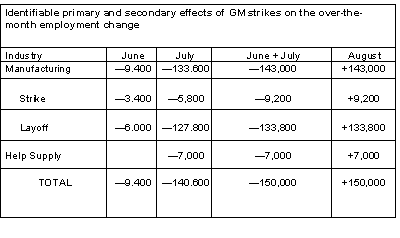An official website of the United States government
 United States Department of Labor
United States Department of Labor
Bureau of Labor Statistics' payroll employment data were affected in both July and August by two strikes at General Motors plants in Flint, Mich. In July, about 150,000 workers dropped from payroll employment due to the strikes and strike-related shutdowns. Most of these losses were strike-related layoffs in a number of manufacturing industries. In August, these losses in payroll employment were regained.

[Chart data—TXT]
As has been widely reported, employees of General Motors struck two separate GM facilities in June. A strike of 3,400 workers occurred in a GM stamping plant (the fabricated metals industry) in Flint, Mich., on June 5. A second strike of 5,800 workers at a parts plant in Flint occurred on June 12. The strikes both ended on July 29. Because the output of each plant is used in GM automobiles and light trucks, the strikes led to shutdowns of other auto and auto-related plants.
In the Current Employment Statistics survey, persons on strike or layoff are not counted as employed if they do not receive pay for any part of the pay period that includes the 12th of the month. Therefore, the July payroll employment change was depressed because of workers on strike and relates layoffs; the August employment increase was buoyed by their return to payrolls.
Additional information is available from "Effects of the General Motors Strikes and Related Shutdown Activity on the Current Employment Statistics Estimates."
Bureau of Labor Statistics, U.S. Department of Labor, The Economics Daily, General Motors strikes affect employment counts at https://www.bls.gov/opub/ted/1998/sep/wk5/art01.htm (visited July 30, 2025).

